Resume
Medical Malpractice Lawyer Cover Letter Examples

May 29, 2025
|
12 min read
Learn how to craft a compelling medical malpractice lawyer cover letter with tips that ensure your skills aren't a malpractice of communication. Make your application stand out by connecting your legal expertise with client care.
4.70 Average rating
Rated by 348 people
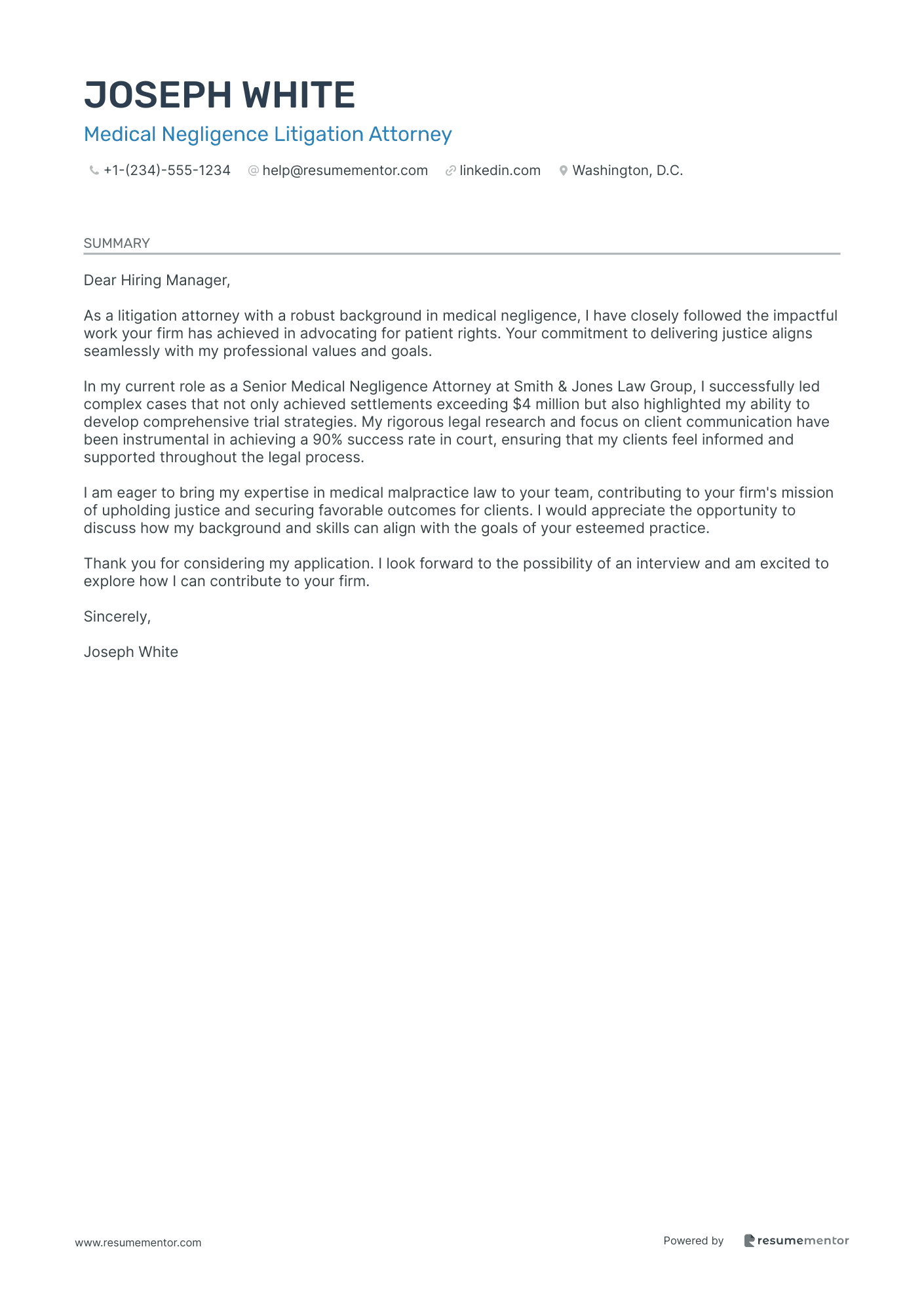
Medical Negligence Litigation Attorney
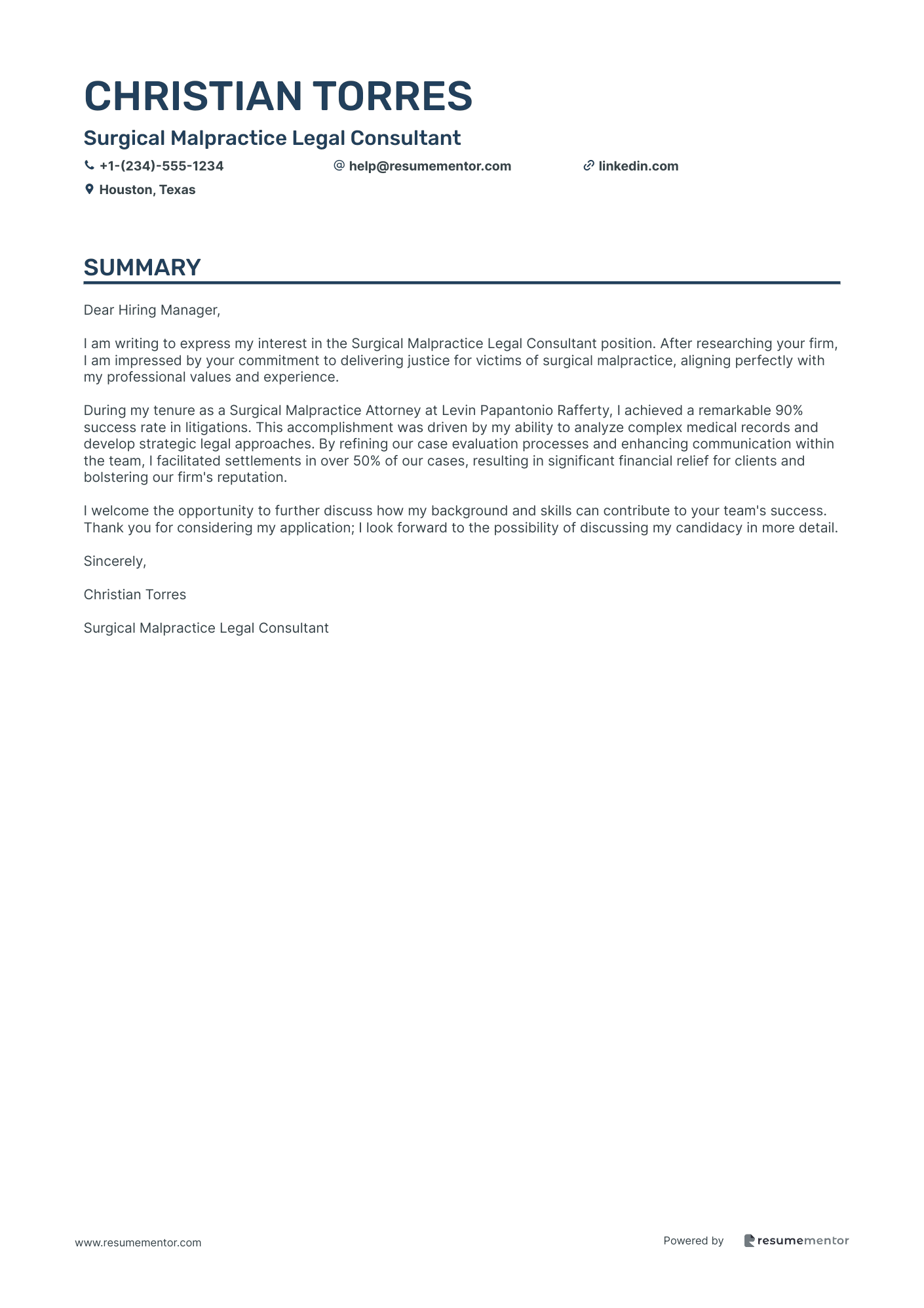
Surgical Malpractice Legal Consultant
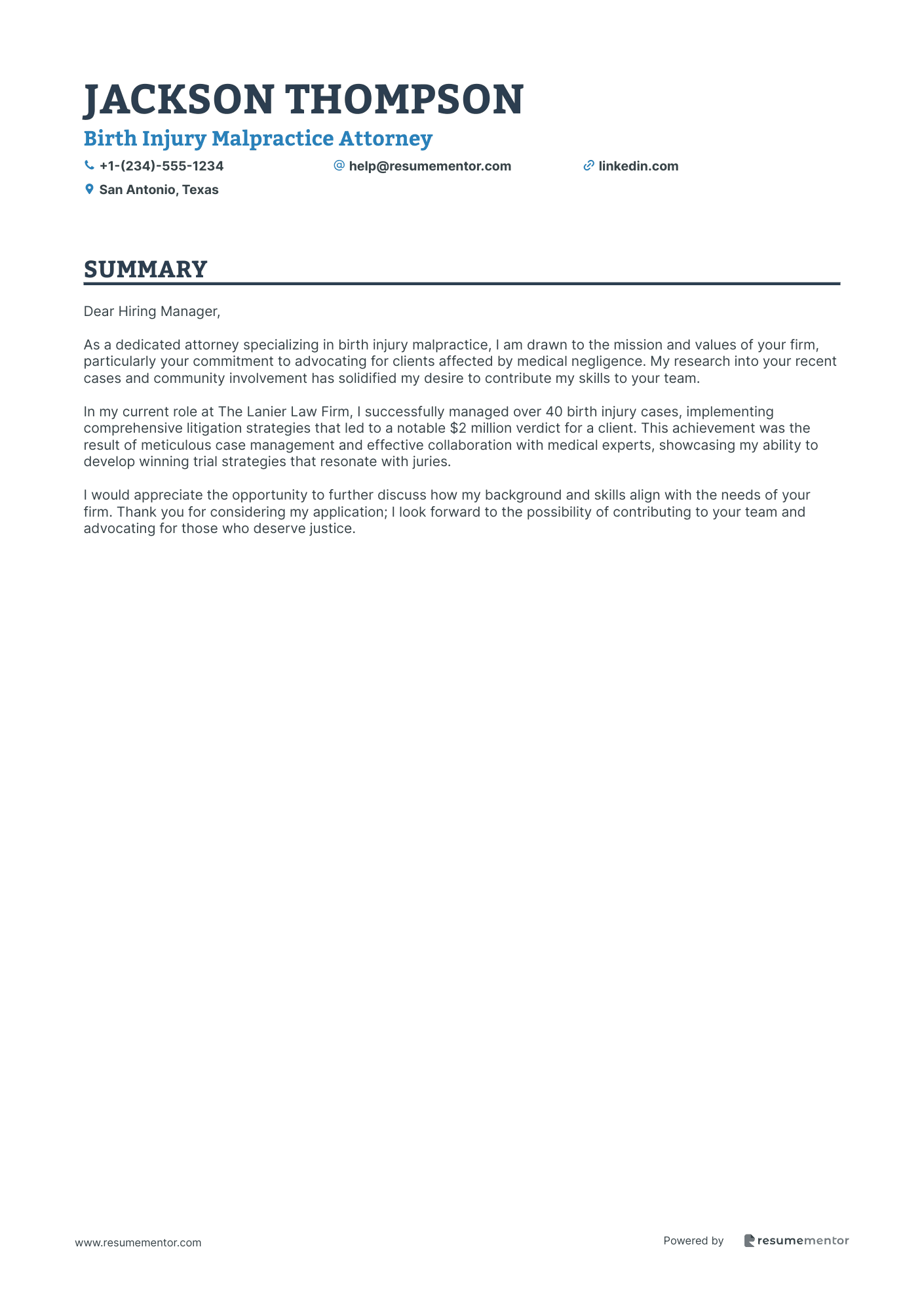
Birth Injury Malpractice Attorney
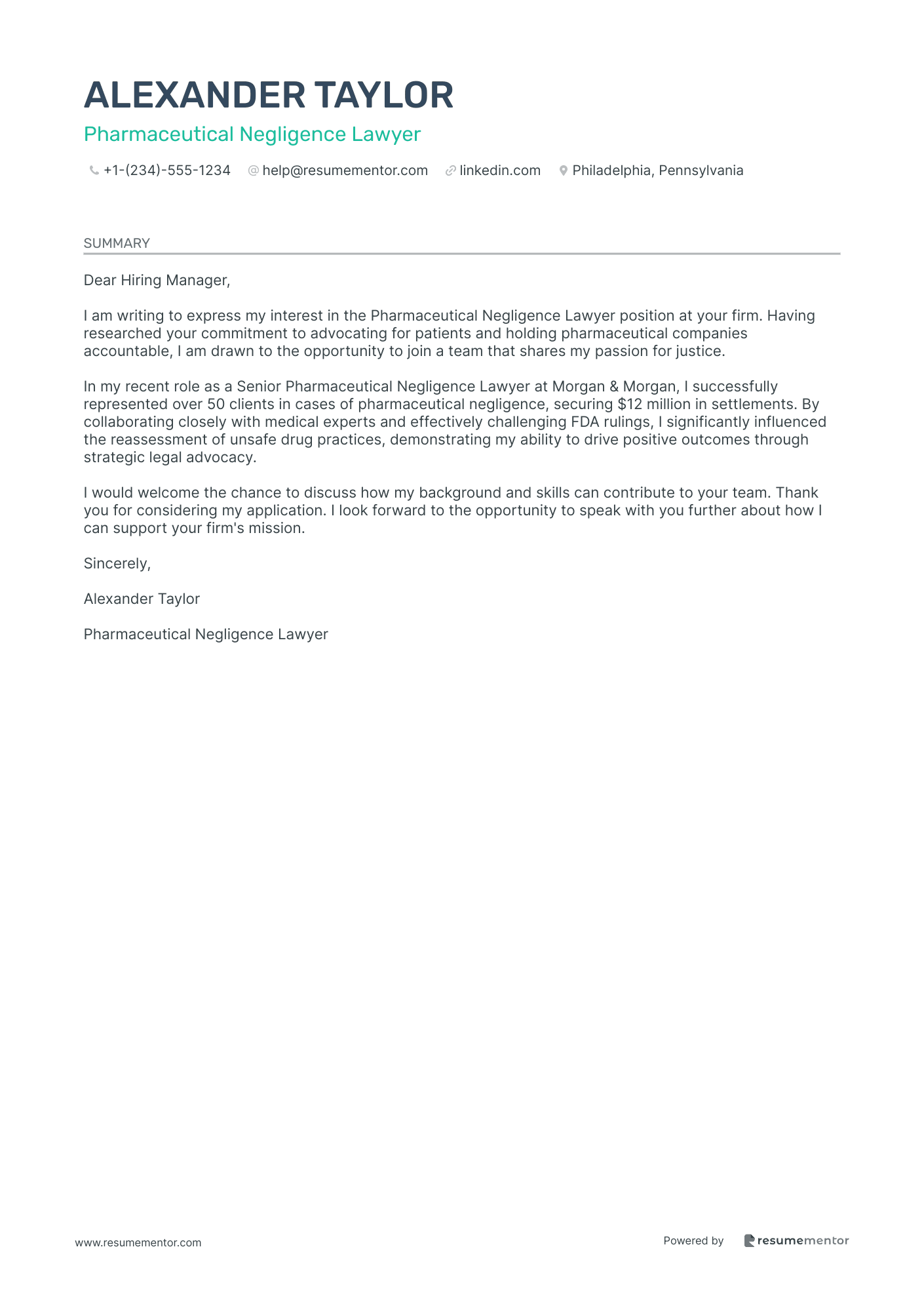
Pharmaceutical Negligence Lawyer
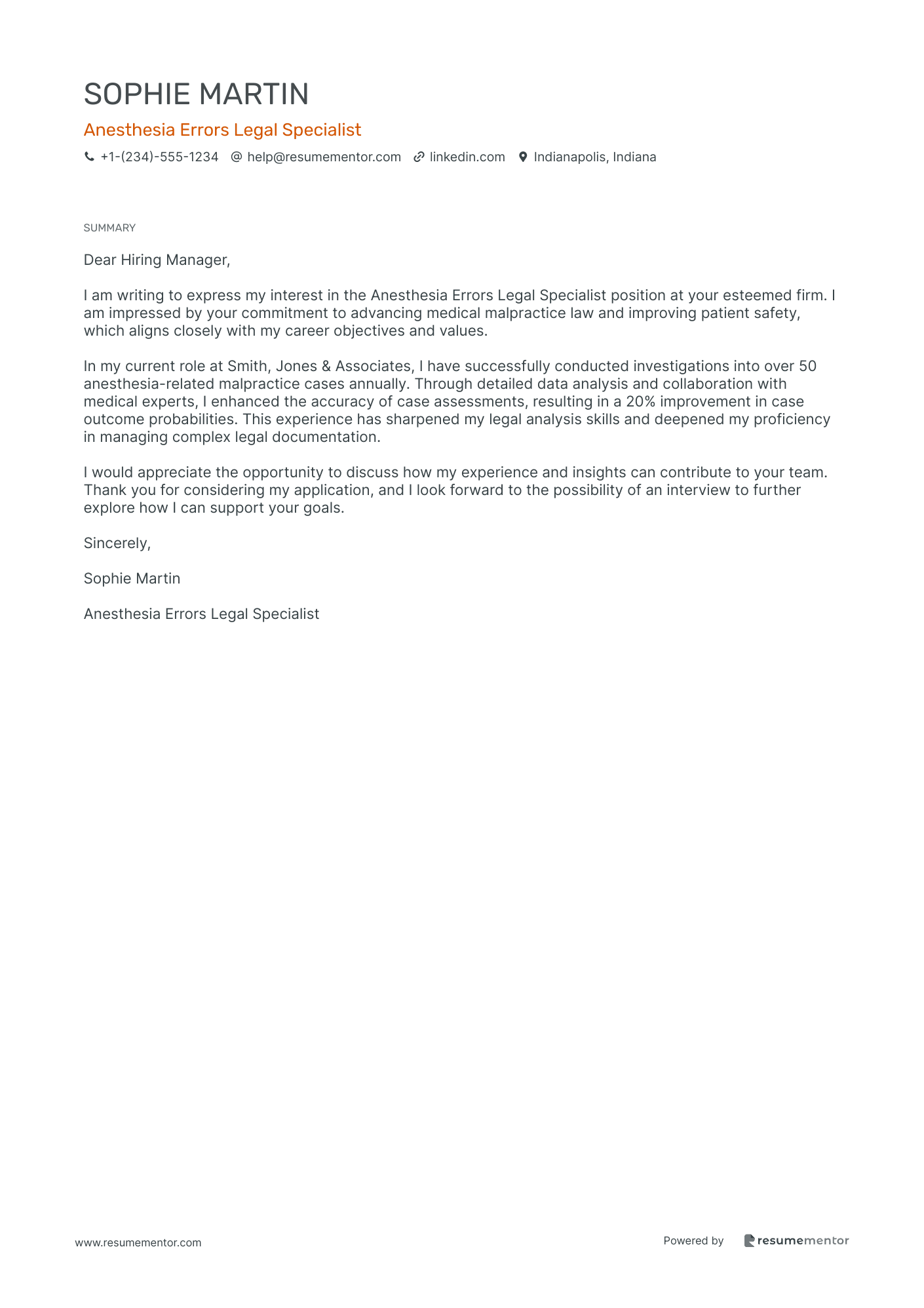
Anesthesia Errors Legal Specialist
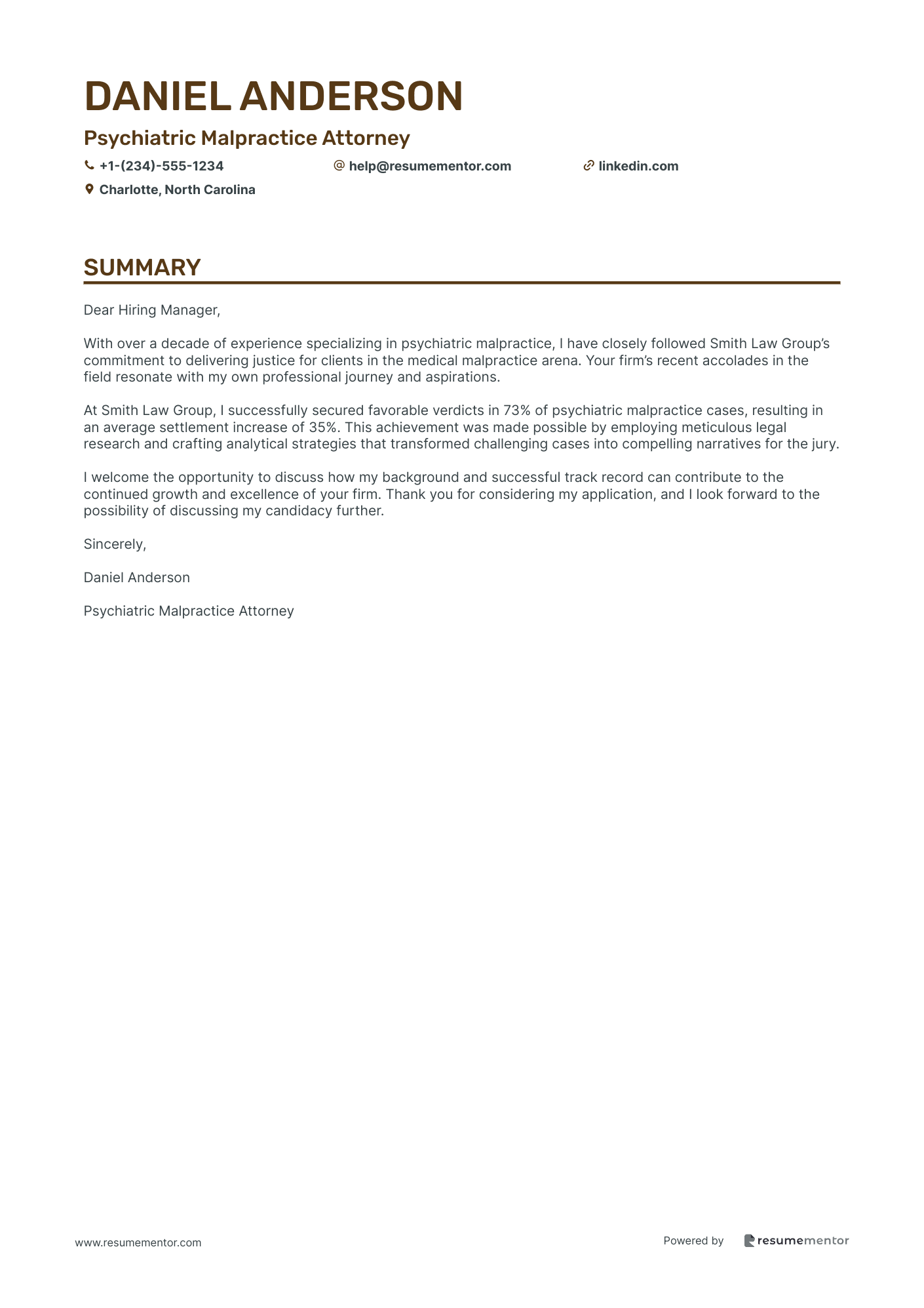
Psychiatric Malpractice Attorney
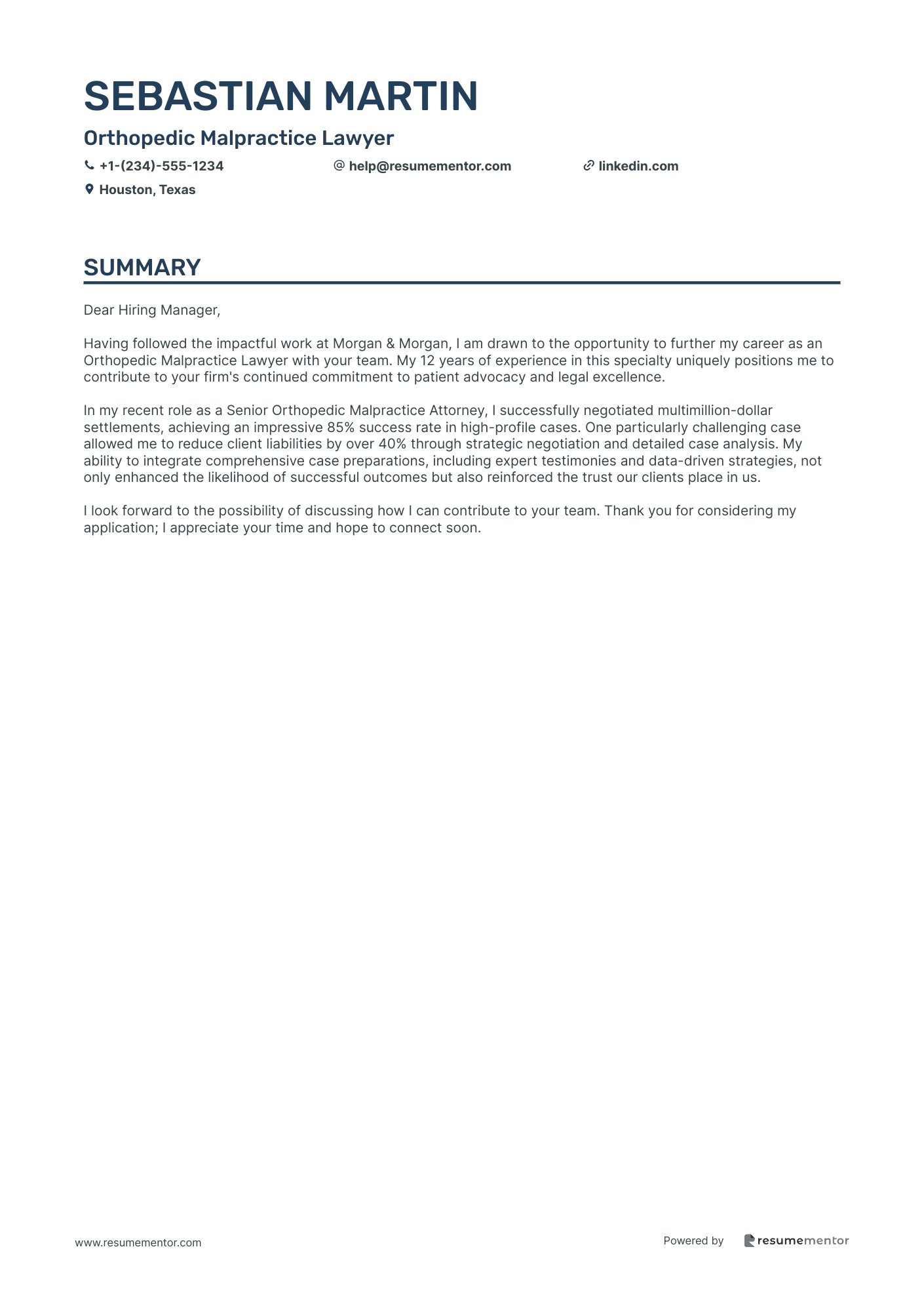
Orthopedic Malpractice Lawyer
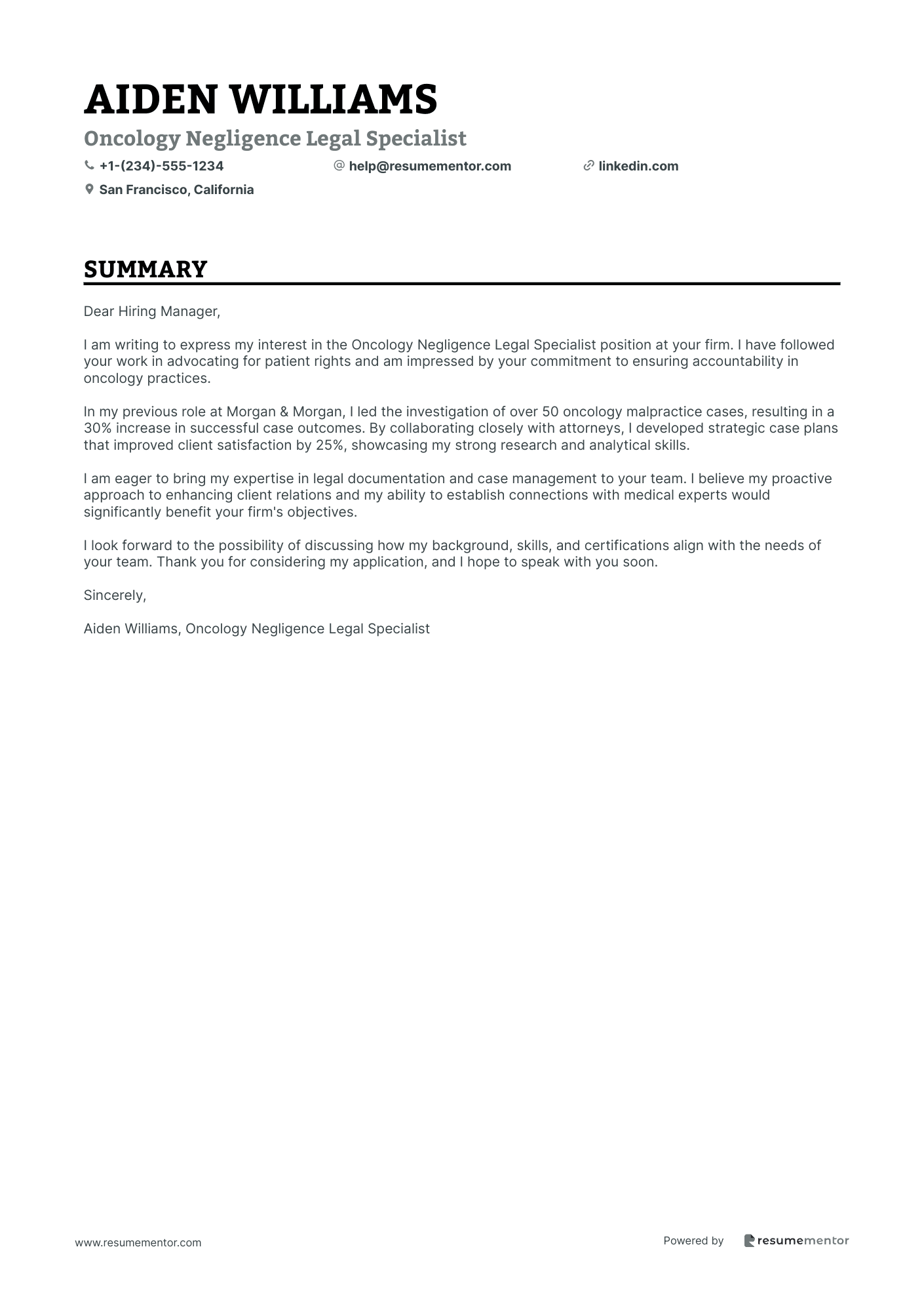
Oncology Negligence Legal Specialist
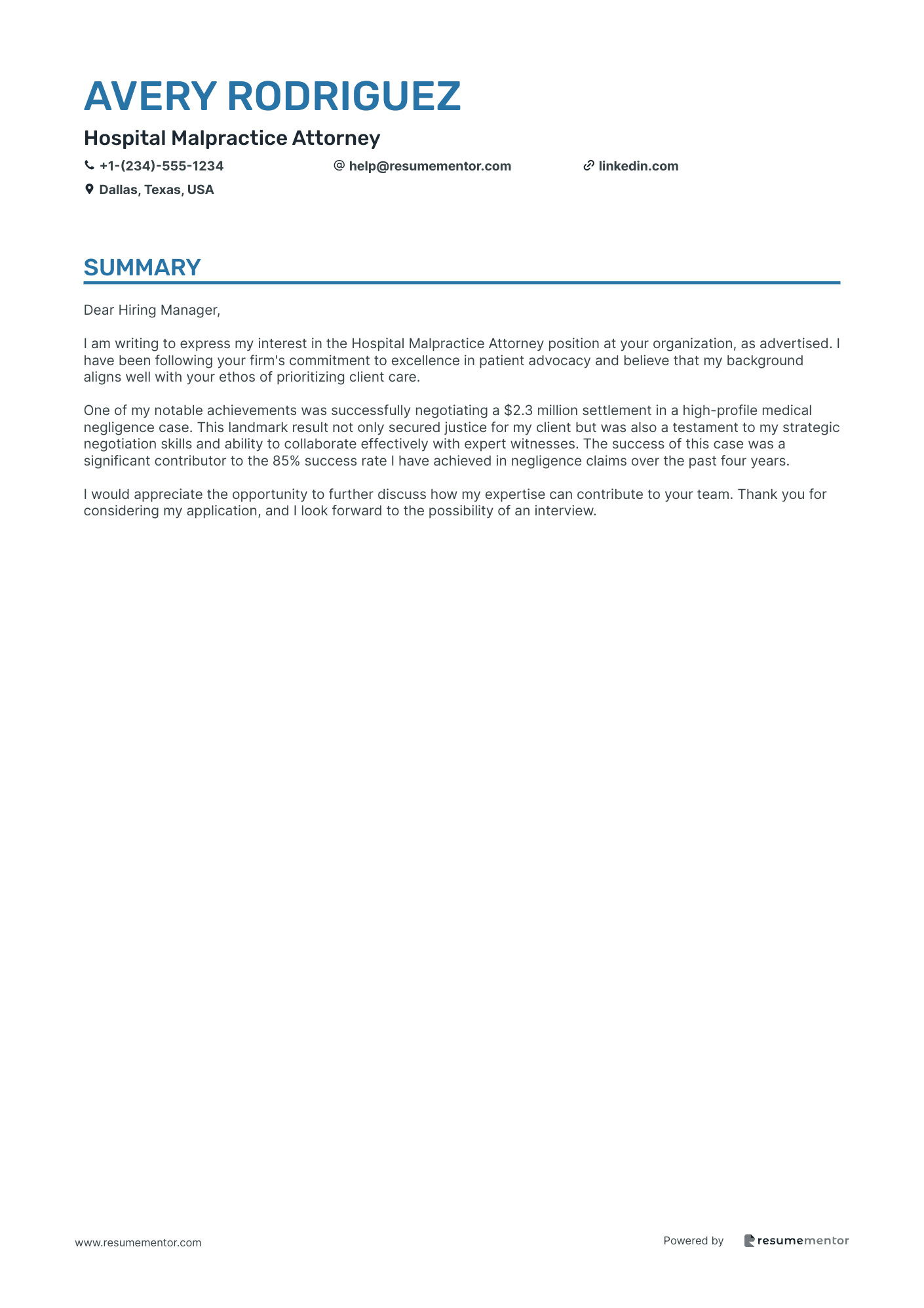
Hospital Malpractice Attorney

Medical Negligence Litigation Attorney cover letter sample
When crafting your cover letter, it is essential to highlight any prior experience in medical law or related fields. Mention specific cases you've worked on and your role in achieving favorable outcomes for clients. Emphasize your analytical skills and attention to detail as these are crucial in assessing medical records and establishing negligence. Include any relevant certifications or specialized training, such as courses in medical malpractice or personal injury law. Provide examples of how your strategies have improved case results, using clear evidence to strengthen your application.
Joseph White
Medical Negligence Litigation Attorney
Summary
Dear Hiring Manager,
As a litigation attorney with a robust background in medical negligence, I have closely followed the impactful work your firm has achieved in advocating for patient rights. Your commitment to delivering justice aligns seamlessly with my professional values and goals.
In my current role as a Senior Medical Negligence Attorney at Smith & Jones Law Group, I successfully led complex cases that not only achieved settlements exceeding $4 million but also highlighted my ability to develop comprehensive trial strategies. My rigorous legal research and focus on client communication have been instrumental in achieving a 90% success rate in court, ensuring that my clients feel informed and supported throughout the legal process.
I am eager to bring my expertise in medical malpractice law to your team, contributing to your firm's mission of upholding justice and securing favorable outcomes for clients. I would appreciate the opportunity to discuss how my background and skills can align with the goals of your esteemed practice.
Thank you for considering my application. I look forward to the possibility of an interview and am excited to explore how I can contribute to your firm.
Sincerely,
Joseph White
Surgical Malpractice Legal Consultant cover letter sample
When applying for this role, it's important to showcase any experience in medical law or personal injury claims. Highlight your understanding of surgical procedures and standards of care. Include any relevant certifications, such as 'Medical Malpractice Law' or similar courses, to demonstrate your expertise. Use specific examples of how your analytical skills have led to successful outcomes in previous cases. Focus on your ability to investigate complex medical records and your proficiency in building strong cases, emphasizing results achieved for previous clients.
Christian Torres
Surgical Malpractice Legal Consultant
Summary
Dear Hiring Manager,
I am writing to express my interest in the Surgical Malpractice Legal Consultant position. After researching your firm, I am impressed by your commitment to delivering justice for victims of surgical malpractice, aligning perfectly with my professional values and experience.
During my tenure as a Surgical Malpractice Attorney at Levin Papantonio Rafferty, I achieved a remarkable 90% success rate in litigations. This accomplishment was driven by my ability to analyze complex medical records and develop strategic legal approaches. By refining our case evaluation processes and enhancing communication within the team, I facilitated settlements in over 50% of our cases, resulting in significant financial relief for clients and bolstering our firm's reputation.
I welcome the opportunity to further discuss how my background and skills can contribute to your team's success. Thank you for considering my application; I look forward to the possibility of discussing my candidacy in more detail.
Sincerely,
Christian Torres
Surgical Malpractice Legal Consultant
Birth Injury Malpractice Attorney cover letter sample
When applying for this role, it’s important to highlight your experience in personal injury law or medical malpractice. Emphasize strong analytical and research skills, as these are essential. If you have taken specialized courses or earned certifications in medical malpractice or trial advocacy, be sure to mention those and include the duration for credibility. Provide specific instances where your legal expertise has led to favorable verdicts or settlements, using a 'skill-action-result' framework to demonstrate your impact on previous cases.
Jackson Thompson
Birth Injury Malpractice Attorney
Summary
Dear Hiring Manager,
As a dedicated attorney specializing in birth injury malpractice, I am drawn to the mission and values of your firm, particularly your commitment to advocating for clients affected by medical negligence. My research into your recent cases and community involvement has solidified my desire to contribute my skills to your team.
In my current role at The Lanier Law Firm, I successfully managed over 40 birth injury cases, implementing comprehensive litigation strategies that led to a notable $2 million verdict for a client. This achievement was the result of meticulous case management and effective collaboration with medical experts, showcasing my ability to develop winning trial strategies that resonate with juries.
I would appreciate the opportunity to further discuss how my background and skills align with the needs of your firm. Thank you for considering my application; I look forward to the possibility of contributing to your team and advocating for those who deserve justice.
Pharmaceutical Negligence Lawyer cover letter sample
When crafting your cover letter, it’s essential to highlight any experience with medical malpractice or personal injury cases. Showcase your understanding of pharmaceutical regulations and the importance of patient safety. Include any relevant certifications, such as in healthcare law or ethics. Provide clear examples of past cases where your advocacy led to favorable outcomes for clients, following a 'client-action-result' structure. Emphasize your strong research skills and attention to detail, as these qualities are crucial for building successful cases.
Alexander Taylor
Pharmaceutical Negligence Lawyer
Summary
Dear Hiring Manager,
I am writing to express my interest in the Pharmaceutical Negligence Lawyer position at your firm. Having researched your commitment to advocating for patients and holding pharmaceutical companies accountable, I am drawn to the opportunity to join a team that shares my passion for justice.
In my recent role as a Senior Pharmaceutical Negligence Lawyer at Morgan & Morgan, I successfully represented over 50 clients in cases of pharmaceutical negligence, securing $12 million in settlements. By collaborating closely with medical experts and effectively challenging FDA rulings, I significantly influenced the reassessment of unsafe drug practices, demonstrating my ability to drive positive outcomes through strategic legal advocacy.
I would welcome the chance to discuss how my background and skills can contribute to your team. Thank you for considering my application. I look forward to the opportunity to speak with you further about how I can support your firm's mission.
Sincerely,
Alexander Taylor
Pharmaceutical Negligence Lawyer
Anesthesia Errors Legal Specialist cover letter sample
When crafting your cover letter, emphasize any relevant experience in medical malpractice or patient advocacy. Showcase your knowledge of anesthesia protocols and regulatory standards. Highlight certifications in medical law or patient safety, and detail your understanding of case management processes. Use specific examples of how your analysis has led to successful outcomes in previous roles. Be sure to follow a 'skill-action-result' format to illustrate how your expertise has improved patient care or minimized liability for healthcare providers in the past.
Sophie Martin
Anesthesia Errors Legal Specialist
Summary
Dear Hiring Manager,
I am writing to express my interest in the Anesthesia Errors Legal Specialist position at your esteemed firm. I am impressed by your commitment to advancing medical malpractice law and improving patient safety, which aligns closely with my career objectives and values.
In my current role at Smith, Jones & Associates, I have successfully conducted investigations into over 50 anesthesia-related malpractice cases annually. Through detailed data analysis and collaboration with medical experts, I enhanced the accuracy of case assessments, resulting in a 20% improvement in case outcome probabilities. This experience has sharpened my legal analysis skills and deepened my proficiency in managing complex legal documentation.
I would appreciate the opportunity to discuss how my experience and insights can contribute to your team. Thank you for considering my application, and I look forward to the possibility of an interview to further explore how I can support your goals.
Sincerely,
Sophie Martin
Anesthesia Errors Legal Specialist
Psychiatric Malpractice Attorney cover letter sample
When crafting your cover letter, focus on relevant legal experience and any specialization in mental health law. Highlight your understanding of medical malpractice standards and the specific challenges in psychiatric cases. If you've participated in relevant workshops or earned certifications in malpractice law, make those known. Show how your skills in negotiation and litigation have led to successful case outcomes. Provide clear instances of how your work has positively affected clients or influenced case results, using a 'skill-action-result' format to demonstrate your impact.
Daniel Anderson
Psychiatric Malpractice Attorney
Summary
Dear Hiring Manager,
With over a decade of experience specializing in psychiatric malpractice, I have closely followed Smith Law Group’s commitment to delivering justice for clients in the medical malpractice arena. Your firm’s recent accolades in the field resonate with my own professional journey and aspirations.
At Smith Law Group, I successfully secured favorable verdicts in 73% of psychiatric malpractice cases, resulting in an average settlement increase of 35%. This achievement was made possible by employing meticulous legal research and crafting analytical strategies that transformed challenging cases into compelling narratives for the jury.
I welcome the opportunity to discuss how my background and successful track record can contribute to the continued growth and excellence of your firm. Thank you for considering my application, and I look forward to the possibility of discussing my candidacy further.
Sincerely,
Daniel Anderson
Psychiatric Malpractice Attorney
Orthopedic Malpractice Lawyer cover letter sample
When applying for this position, it’s important to showcase your experience in personal injury law, particularly related to medical malpractice. Highlight any cases you’ve handled that involved orthopedic issues, detailing your role and the outcomes. Mention any relevant certifications, continuing legal education, or memberships in professional organizations that bolster your qualifications. Discuss your skills in trial preparation, negotiation, and client advocacy. Use specific examples that demonstrate your ability to achieve favorable verdicts and settlements for clients, emphasizing how your efforts made a difference.
Sebastian Martin
Orthopedic Malpractice Lawyer
Summary
Dear Hiring Manager,
Having followed the impactful work at Morgan & Morgan, I am drawn to the opportunity to further my career as an Orthopedic Malpractice Lawyer with your team. My 12 years of experience in this specialty uniquely positions me to contribute to your firm's continued commitment to patient advocacy and legal excellence.
In my recent role as a Senior Orthopedic Malpractice Attorney, I successfully negotiated multimillion-dollar settlements, achieving an impressive 85% success rate in high-profile cases. One particularly challenging case allowed me to reduce client liabilities by over 40% through strategic negotiation and detailed case analysis. My ability to integrate comprehensive case preparations, including expert testimonies and data-driven strategies, not only enhanced the likelihood of successful outcomes but also reinforced the trust our clients place in us.
I look forward to the possibility of discussing how I can contribute to your team. Thank you for considering my application; I appreciate your time and hope to connect soon.
Oncology Negligence Legal Specialist cover letter sample
When applying for this role, emphasize your experience with medical malpractice or personal injury cases. Highlight any familiarity with oncology treatment protocols and patient care standards. Strong research and analytical skills are essential; mention any relevant certifications or coursework, such as "Torts" or "Medical Law." It's important to showcase your ability to communicate complex medical terms clearly. Use a 'skill-action-result' format to demonstrate how your approach has successfully influenced case outcomes or helped clients receive justice. Tailor your examples to specific achievements.
Aiden Williams
Oncology Negligence Legal Specialist
Summary
Dear Hiring Manager,
I am writing to express my interest in the Oncology Negligence Legal Specialist position at your firm. I have followed your work in advocating for patient rights and am impressed by your commitment to ensuring accountability in oncology practices.
In my previous role at Morgan & Morgan, I led the investigation of over 50 oncology malpractice cases, resulting in a 30% increase in successful case outcomes. By collaborating closely with attorneys, I developed strategic case plans that improved client satisfaction by 25%, showcasing my strong research and analytical skills.
I am eager to bring my expertise in legal documentation and case management to your team. I believe my proactive approach to enhancing client relations and my ability to establish connections with medical experts would significantly benefit your firm's objectives.
I look forward to the possibility of discussing how my background, skills, and certifications align with the needs of your team. Thank you for considering my application, and I hope to speak with you soon.
Sincerely,
Aiden Williams, Oncology Negligence Legal Specialist
Hospital Malpractice Attorney cover letter sample
When crafting your cover letter, emphasize your specialized knowledge in medical laws and regulations. Highlight any successful cases you've managed, detailing your role in achieving positive outcomes for clients. If you have completed courses in medical malpractice or trial advocacy, mention these to showcase your commitment to the field. Demonstrating strong analytical and research skills is essential, as these abilities directly impact case preparation. Include examples of how your legal strategies led to favorable settlements or court decisions, following a clear 'skill-action-result' format.
Avery Rodriguez
Hospital Malpractice Attorney
Summary
Dear Hiring Manager,
I am writing to express my interest in the Hospital Malpractice Attorney position at your organization, as advertised. I have been following your firm's commitment to excellence in patient advocacy and believe that my background aligns well with your ethos of prioritizing client care.
One of my notable achievements was successfully negotiating a $2.3 million settlement in a high-profile medical negligence case. This landmark result not only secured justice for my client but was also a testament to my strategic negotiation skills and ability to collaborate effectively with expert witnesses. The success of this case was a significant contributor to the 85% success rate I have achieved in negligence claims over the past four years.
I would appreciate the opportunity to further discuss how my expertise can contribute to your team. Thank you for considering my application, and I look forward to the possibility of an interview.
Related Articles

Continue Reading
Check more recommended readings to get the job of your dreams.
Resume
Resources
Tools
© 2026. All rights reserved.
Made with love by people who care.
